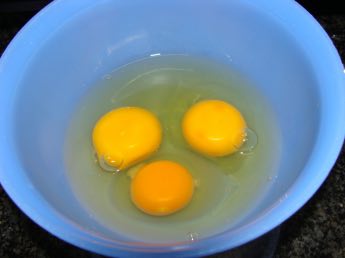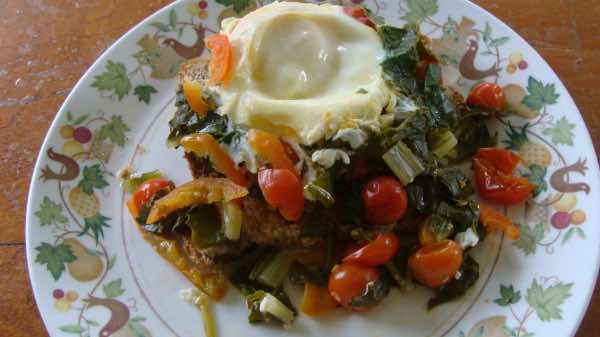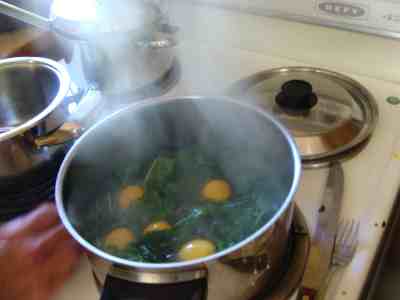- Homepage
- Cholesterol
- Are Eggs Good Or Bad
Are eggs good or bad?
Are eggs good or bad, or even perhaps evil is a question that has utterly confused nutritional scientists for decades; one week they are in, the next out.
So what does the latest research have to say? Are eggs good or bad?
And what is a "proper egg?" Can you spot which one of those below stands out in the crowd?
This page was last updated on 9th January, 2025.

Egg-white
The white is the non-controversial part when trying to answer the question are eggs good or bad; universally scientists agree that it is an excellent food, containing all nine of the essential amino acids.
In that sense it is a "complete" protein and in theory one could survive with no other sources of amino-acids.
 Which of these is free-range and fertile?
Which of these is free-range and fertile?Of course in the natural state, all eggs would be fertilized; the function of the white is to provide protein for the growing embryo that is the yolk.
It is in fact mostly water in which these amino acids are dissolved; the white contains nearly two-thirds of the total protein in the egg.
An egg has about 3.6 g of protein. A child requires roughly about 30 grams per day; and an adult 50.
So an egg-white alone contains nearly one tenth of our daily protein needs.
And a whole egg including the yolk would provide about one-fifth.
Egg yolk
The yolk is the controversial part when investigating whether eggs are good or bad; it is where the fat is found and a large part is cholesterol.
Previously when too much dietary cholesterol was thought to be the true cause of heart disease, Medicine recommended we eat few or no eggs.
Now the heart foundation recommends an egg a day. Why is that? The cholesterol from your food has little influence on the circulating lipoproteins in the blood in the vast majority of people. Most of it is synthesized in the liver regardless of the fat you consume.

While intense debate continues in attempting to answer the question whether eggs are good or bad, it is now considered that refined carbohydrate is the chief cause of heart disease; by abnormally raising blood glucose and giving rise to obesity. That in turn inflames the arteries and affects circulation.
That glucose from sugar and starch we have consumed is then joined onto a protein molecule in the liver and turned into the much feared LDLs. It is excessive refined carbohydrate consumption that causes raised cholesterol, not the fat in eggs, dairy products and meat that we may be eating.
The yolk supplies the vitamins, minerals and all the fat to the growing embryo; and about a third of the protein.
Of particular interest to the DC is the fact that half the fat in the egg yolk is oleic acid; that which forms the myelin sheath around a nerve, without which it cannot conduct impulses.
You may have heard of de-myelinating diseases like multiple sclerosis; loss of that fatty sheath.
So far there is no controversy; all is good. However nearly a third of the fat in the egg yolk is saturated; that is what has bedeviled scientists for decades. Previously it was thought to cause heart disease.
Your eyes
As an aside the yellow colour in the yolk comes from three very important phytochemicals for the eyes; lutein, zeaxanthin and beta carotene.
Eggs and
yellow maize are the two richest sources of these nutrients, more even than dark-green
leafy vegetables like kale[6].
The egg yolk is also one of the few sources of vitamin B12; a deficiency causes a terminal disease called pernicious anemia. It is undeniably important for our well-being.
Dietary cholesterol
Whilst raised blood LDL certainly does contribute to plaque that lines and may narrow our arteries, researchers now conclude that the saturated fats which we eat in butter and eggs, for example, have little influence on the circulating cholesterol.
So whilst eggs were frowned upon for decades, not good but thoroughly bad, now they are back; and in fact recommended. They should never have been sent to Coventry in the first place.
Butter is back and so are eggs.
It is the inflammatory substances in the blood that in the first instance damage the lining of arteries; thereafter the plaque is laid down and may rupture forming a clot. Raised blood sugar forming "AGEs" and the pernicious chemicals in cigarette smoke are the chief villains of the peace, not cholesterol.
"Intakes of fish, poultry and eggs were not significantly associated with risk of atherosclerotic cardiovascular disease."
- Tufts University researchers
PURE study
This very large study was conducted in 21 countries, excluding those with a history of cardiovascular disease; researchers found that an intake of more than 7 eggs per week, as compared to less than one was not associated with a higher blood fat score, CVD deaths or total mortality[4].
Please note that this finding specifically excludes those with a history of CVD.
DIABEGG study
Researchers commenting in the Diabetes and Egg study made important statements. They found that those with insulin resistance or T2D on a healthy diet, who consumed more than 12 per week had no differences in plasma glucose, HbA1c or serum lipids; as compared to one or less.
The inflammation markers too were the same.
They were comparing two groups of diabetics on a sensible weight loss program; there were no adverse effects from the high egg consumption after a 12 month followup and no difference in pounds lost.
Once again it is to be emphasized that both groups were on a well-balanced weight loss programme high in olive oil and avocados. This cannot and should not be extrapolated to those eating junk food[5].
"Drugs such as metformin which are used to treat type 2 diabetes, deplete vitamin B12."
- Nishtha Patel, clinical nutritionist
Are eggs good or bad?
 Eggs Hilton[8]
Eggs Hilton[8]Are eggs good or bad is a question that at least in part has been finally answered; it depends also on what else you are eating. Provided you enjoy them with plenty of vegetables, using what is known as "cholesterol credits" one need have absolutely no fear or guilt.
New research published on the JAMA network[1] found that there was a very small 3.5% increased risk when considering the association of dietary cholesterol or egg consumption with incident cardiovascular disease and mortality, .
But what's really interesting is this statement by the authors.
"The associations between dietary cholesterol and incident CVD were no longer significant after adjusting for consumption of red meat, whether processed or not."
In short you can have your egg and eat it provided you don't also have rashers of bacon regularly; or sausage.
And in another 2019 study just to add more confusion, researchers reporting in the journal Circulation after following 400 000 people for 13 years concluded that the risk for ischemic heart disease was positively associated with consumption of red and processed meat; and inversely with yogurt, cheese and eggs[2].
So few people eat organic grass-fed beef that researchers make no distinction; I suspect there may well be a difference.
An inverse relationship means that the more yogurt, cheese and eggs you eat, the less likelihood you are of having heart disease.
Again it's the bacon eaten with them that is the problem, not the eggs per se.
So even scientists are not totally sure whether eggs are good or bad. The weight of evidence suggests that as part of a wholesome meal they come highly recommended.
Diabetes and eggs
Researchers publishing in AJCN found that men consuming about 5 eggs a week had a 38% lower risk of T2D. That is probably because of their satiating influence, decreasing the intake of refined carbs; breakfast cereals and toast.
Bone strength
Researchers have also found that egg consumption has a positive influence on bone metabolism.
Cognitive decline
Researchers reporting in the prestigious journal "Alzheimers Dement" have found that after ten years, participants with the highest B12 status had significantly slower declines in memory, executive function and language as compared with those with a low level[9].
Whilst the researchers do not specifically mention that eggs are good, they are a reasonable source of B12; clams, liver and fish are the best.
It's the processed meat, cake flour and sugar
So fried eggs on white toast, rashers of bacon and sausage would be a problem; so too a pancake with strawberry jam or syrup on the side.
So too cakes are a cause for concern; but are eggs good or bad? Or is it the refined flour and sugar?
Enjoyed as Eggs Florentine on wholewheat toast you need have no concerns is our understanding.

Eggs benedict
I do not like making Eggs Benedict for two reasons. Firstly the bacon is smoked red meat which has definitely been strongly linked by WHO scientists to nasty tumours.
And secondly it is a lot of schlepp compared to Eggs Hilton. Just making the Hollandaise sauce is laborious.
A couple rashers of bacon with your Eggs Florentine on high and holy days is probably okay. Let's not get too neurotic.
Proper eggs
Proper eggs are those which are both fertilised and free-range; in effect not dissimilar to what would come from a hen in the wild.
There is simply a vast difference when comparing free range eggs and with those from hens that spend their whole lives in tiny wire cages.
Despite the public opinion to date I can find no research showing that there are sound reasons for paying more for fertilised eggs; I suspect it's not an urban myth but have no grounds for claiming it.
I can assure you that a fresh egg from this little hen tastes quite different to that from a commercial farm; the rooster is about somewhere, probably looking out for raptors or paying attention to one of the other ladies.

Food allergies
Food allergy, eczema and hay fever rates have trebled over the last thirty years; 50% of children have at least one. Peanuts and eggs top the list but there are many more including milk, shellfish and soybeans for example[7].
A reaction occurs within minutes; swelling of the face, lips or eyes for example. There may be hives on the skin, vomiting and difficulty breathing.
Current guidelines recommend introducing small amounts, one at a time from six months of age to infants. Delaying exposing to children of these allergens increases the risk of developing a problem.
- Associations of Dietary Cholesterol or Egg Consumption With Incident Cardiovascular Disease and Mortality.
- Consumption of Meat, Fish and Dairy Products with the Risk of Ischemic Heart Disease; and Eggs too
- Get the Facts on Organic and Free-Range Eggs
- Association of egg intake with blood lipids, cardiovascular disease and mortality in 177,000 people in 50 countries
- Effect of a high-egg diet on cardiometabolic risk factors in people with type 2 diabetes
- Fruits and vegetables that are sources for lutein and zeaxanthin: the macular pigment in human eyes. Web: https://bjo.bmj.com/content/82/8/907
- What's the Truth Behind Rising Food Allergies in Kids?
- Eggs Hilton
- Higher vitamin B12 from mid- to late life is related to slower rates of cognitive decline
When browsing use right click and "Open Link in New Tab" or you may get a bad gateway signal.
The material expressed on this page is gleaned from the nutritional and environmental literature; it is clearly referenced. A plain distinction is made between the author's opinion and that which is scientifically proven. When in doubt consult your health professional.
To suggest a correction or clarification, write to Dr Bernard Preston here. Contact.
Newsletter
Our newsletter is entitled "create a cyan zone" at your home, preserving both yourself and Mother Earth for future generations; and the family too, of course. We promise not to spam you with daily emails promoting various products. You may get an occasional nudge to buy one of my books.
Here are the back issues.
- Lifestyle and ideal body weight
- What are ultra-processed foods?
- Investing in long-term health
- Diseases from plastic exposure
- Intensive lifestyle management for obesity has limited value
- A world largely devoid of Parkinson's Disease
- The impact of friendly bacteria in the tum on the prevention of cancer
- There's a hole in the bucket
- Everyone is talking about weight loss drugs
- Pull the sweet tooth
- If you suffer from heartburn plant a susu
- Refined maize meal and stunting
- Should agriculture and industry get priority for water and electricity?
- Nature is calling
- Mill your own flour
- Bake your own sourdough bread
- Microplastics from our water
- Alternative types of water storage
- Wear your clothes out
- Comfort foods
- Create a bee-friendly environment
- Go to bed slightly hungry
- Keep bees
- Blue zone folk are religious
- Reduce plastic waste
- Family is important
- What can go in compost?
- Grow broad beans for longevity
- Harvest and store sunshine
- Blue zone exercise
- Harvest and store your rainwater
- Create a cyan zone at your home
Did you find this page interesting? How about forwarding it to a friendly book or food junkie? Better still, a social media tick would help.
- Homepage
- Cholesterol
- Are Eggs Good Or Bad
Address:
56 Groenekloof Rd,
Hilton, KZN
South Africa
Website:
https://www.bernard-preston.com